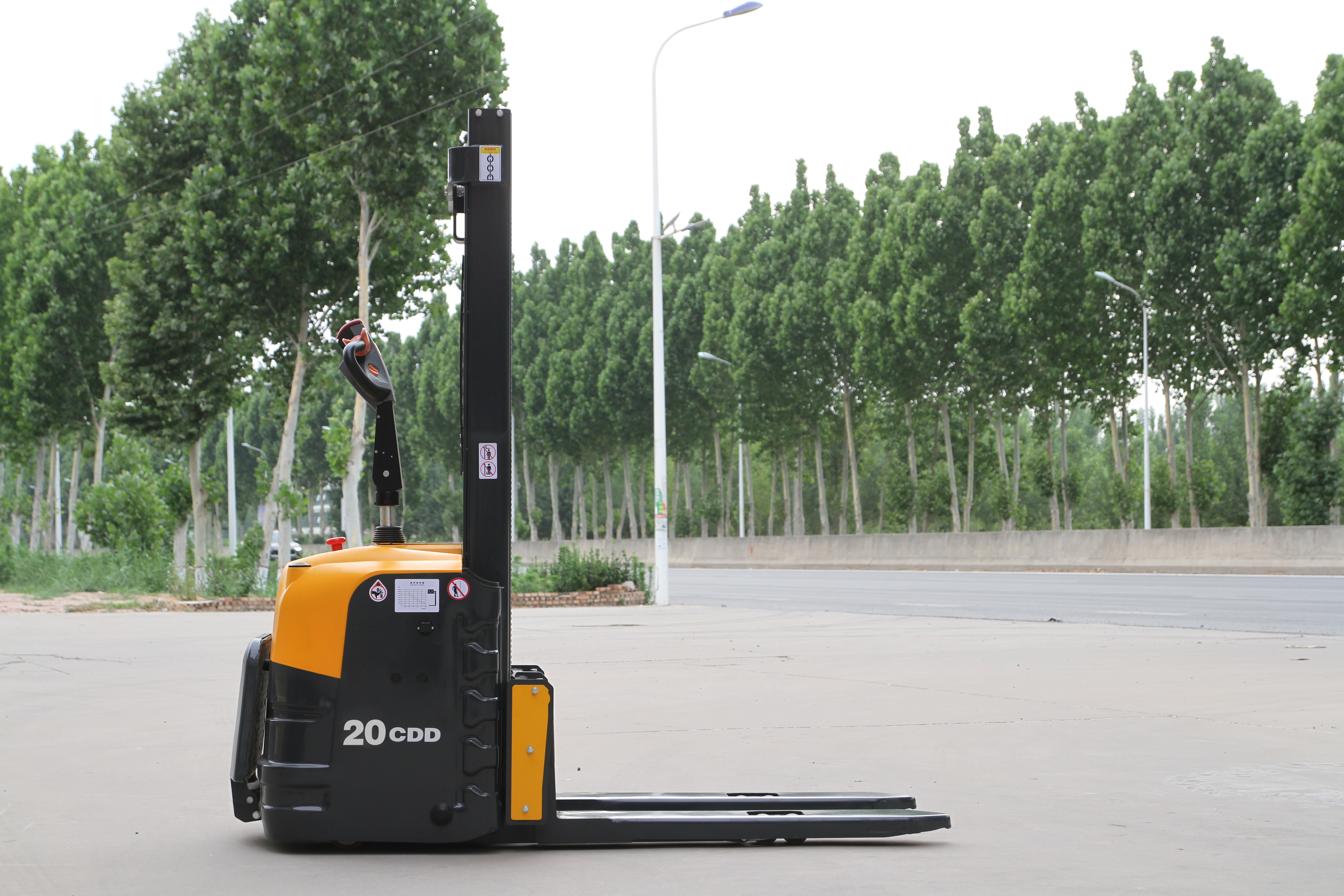Bir istifleyici fabrikası, çeşitli endüstriyel, ticari ve lojistik ortamlarda paletlenmiş malları kaldırmak, taşımak ve istiflemek için kullanılan malzeme taşıma ekipmanı olan istifleyicilerin üretimine odaklanmış özel bir imalat tesisidir. Bu fabrikalar, ileri teknolojiyi, deneyimli iş gücünü ve verimli üretim süreçlerini bir araya getirerek dünya çapındaki işletmelerin, küçük perakende mağazalarından büyük dağıtım merkezlerine kadar çeşitli ihtiyaçlarını karşılayan yüksek kaliteli istifleyiciler üretir. Bir istifleyici fabrikası genellikle elektrikli istifleyiciler, hidrolik istifleyiciler, yüksek kaldırma kapasiteli istifleyiciler ve manuel istifleyiciler gibi birçok farklı istifleyici türünü üretir; her biri belirli uygulamalar ve yük kapasiteleri için tasarlanmıştır. Bir istifleyici fabrikasındaki üretim süreci, tasarım ve mühendislik aşamasıyla başlar. Uzman mühendisler, her istifleyici modeli için detaylı teknik çizimler oluşturan bilgisayar destekli tasarım (CAD) yazılımlarını kullanır; burada yük kapasitesi, kaldırma yüksekliği, hareket kabiliyeti, güvenlik özellikleri ve enerji verimliliği gibi faktörler göz önünde bulundurulur. Daha sonra prototipler geliştirilir ve performans ve güvenlik standartlarını karşıladıklarından emin olmak için kapsamlı testlere tabi tutulur. Bu test aşaması, çerçevenin ve kaldırma mekanizmasının dayanıklılığını değerlendirmek için yapılan dayanım testleri, kaldırma hızı ve batarya ömrünü değerlendiren performans testleri ve aşırı yükleme koruma sistemi ve acil durum durdurma gibi güvenlik özelliklerinin etkinliğini doğrulayan güvenlik testlerini içerir. Bu testlerden elde edilen geri bildirimler, seri üretime başlamadan önce tasarımın iyileştirilmesinde kullanılır. Tasarım nihayete erdiğinde üretim süreci başlar ve öncelikle kritik bileşenlerin imalatı yapılır. İstifleyicinin temel taşıyan iskeleti olan çerçeve, genellikle yüksek dayanımlı çelikten üretilir; bu çerçeve, lazer kesiciler ve robot kaynakçılar gibi gelişmiş makineler kullanılarak kesilir, kaynatılır ve şekillendirilir. Bu makineler, hassasiyet ve tutarlılığı sağlayarak güçlü, dayanıklı ve ağır kullanım şartlarına dayanabilecek çerçeveler üretir. Hidrolik ya da elektrikli olmasına göre seçilen kaldırma mekanizması, silindirler, pompalar, motorlar ve dişliler gibi yüksek kaliteli bileşenlerle monte edilir; bu bileşenler ya güvenilir tedarikçilerden temin edilir ya da kalite kontrolünü sağlamak amacıyla fabrikanın kendi atölyelerinde üretilir. Diğer önemli bir bileşen olan çatal (fork), ağır yükleri kaldırmak için gerekli olan dayanıklılığı sunan sertleştirilmiş çelikten yapılır ve standart paletlerle tam bir uyum sağlayacak şekilde hassas olarak işlenir. Bir sonraki üretim aşaması olan montaj sürecinde tüm bileşenler bir araya getirilerek nihai istifleyici oluşturulur. Uzman teknisyenler, iskelet, kaldırma mekanizması, itici sistem, batarya ve kontrol sistemlerinin verimli bir şekilde birleştirilmesi için montaj hatlarını kullanır. Modern istifleyici fabrikalarında bu aşamada otomasyon önemli bir rol oynar; örneğin kaldırma mekanizmasının iskeleye sabitlenmesi ya da bataryanın yerleştirilmesi gibi görevlerde robotik kollar devreye girer. Bu otomasyon, üretim verimliliğini artırır, insan hatası riskini azaltır ve daha hızlı üretim imkanı sağlar. Her istifleyici, montaj sırasında ve sonrasında dikkatlice kontrol edilerek tüm bileşenlerin doğru şekilde takıldığını ve düzgün çalıştığını garanti altına alır. Kalite kontrol, bir istifleyici fabrikasında en yüksek öncelikli konulardan biridir; üretim sürecinin her aşamasında yapılan çok sayıda kontrol sayesinde her bir istifleyicinin en yüksek kalite ve güvenlik standartlarını karşıladığından emin olunur. Denetçiler, kaynakların dayanıklılığını ve bütünlüğünü kontrol eder, kaldırma mekanizmasının sorunsuz çalıştığını doğrular ve kontrol sistemlerinin tepki verdiğini test eder. Ayrıca her istifleyici, maksimum yüküyle birlikte tam yüksekliğe kaldırma, ileri geri hareket etme ve acil durum durdurma gibi güvenlik özelliklerinin devreye girip girmediğini kontrol eden performans testlerine tabi tutulur. Gerekli standartları karşılamayan istifleyiciler tekrar işlenmek üzere geri gönderilir; böylece fabrikadan sadece yüksek kaliteli ekipmanların çıktığı garanti altına alınır. Birçok istifleyici fabrikası aynı zamanda uluslararası kuruluşlar olan ISO gibi sertifikalar alarak üretim süreçlerinin tutarlı ve güvenilir olduğundan emin olur; bu kuruluşlar kalite yönetim sistemleri için standartlar belirler. İstifleyici fabrikaları, müşterilerinin özel ihtiyaçlarını karşılamak için genellikle özelleştirme seçenekleri de sunar. Bu, belirli bir uygulamaya uygun olarak standart bir istifleyicinin yük kapasitesi, kaldırma yüksekliği ya da çatal boyutlarının değiştirilmesini içerebilir. Örneğin, gıda ve içecek sektöründeki bir müşteri, sık sık temizlenmesine dayanabilmesi için paslanmaz çelik bileşenlere sahip bir istifleyici talep edebilir; soğuk hava deposunda çalışan bir müşteri ise soğuk dirençli bataryaya sahip bir istifleyiciye ihtiyaç duyabilir. Fabrikalar müşterilerinin ihtiyaçlarını anlamak ve modüler tasarımlar sayesinde bileşenlerin kolayca değiştirilebildiği özelleştirilmiş çözümler geliştirmek için müşterileriyle yakından çalışır. Bu esneklik, müşterilerin operasyonel ihtiyaçlarına tam olarak uygun istifleyiciler almasını sağlar ve verimliliği ile üretkenliği artırır. Üretimin yanı sıra birçok istifleyici fabrikası müşterilerine çeşitli destek hizmetleri de sunar. Bu hizmetler arasında satış sonrası bakım ve onarım hizmetleri yer alır; bu hizmetlerde yetkili teknisyenler istifleyicilerin bakımını yapar ve gerekli parçaları değiştirir. Fabrikalar aynı zamanda müşterilerin istifleyicilerini güvenli ve verimli bir şekilde kullanmalarını sağlamak için eğitim programları da sunabilir; bu sayede operatörler ekipmanları doğru şekilde nasıl kullanacaklarını ve nasıl bakım yapacaklarını öğrenir. Bazı fabrikaların dünya çapında bir distribütör ve bayi ağı vardır; bu da müşterilerin istifleyicileri yerel olarak satın almasını ve destek hizmetlerine erişmesini kolaylaştırır. Bu küresel varlık sayesinde istifleyici fabrikaları, farklı ülkelerde ve bölgelerde yer alan müşterilerine hizmet verebilir ve yerel düzenlemelere ve standartlara uyum sağlayabilir. Modern istifleyici fabrikalarında sürdürülebilirlik giderek daha fazla önem kazanmaktadır; birçok fabrika çevresel etkilerini azaltmak için çevre dostu uygulamalar benimsemektedir. Bunlar arasında enerji verimli makinelerin kullanılması ve fabrikanın enerjilendirilmesi için güneş enerjisi gibi yenilenebilir enerji kaynaklarının kullanılması yer alır. Atık azaltma da bir diğer önceliktir; üretim sürecinde oluşan hurda metal ve diğer malzemeler geri dönüştürülerek tekrar kullanılır. Elektrikli istifleyicilerin üretiminde fabrikalar daha uzun ömürlü ve ömrü sonunda geri dönüştürülebilen lityum-iyon piller gibi daha enerji verimli bataryalar geliştirmeye odaklanmaktadır. Bu sürdürülebilir uygulamalar, fabrikanın karbon ayak izini azaltmanın yanında, kendi çevre etkilerini azaltmak isteyen müşterilerin de ilgisini çeker. İstifleyici fabrikaları sektörü, istifleyicilerin performansını, verimliliğini ve güvenliğini artırmak için devam eden araştırmalar ve gelişmelerle yönlendirilmektedir. Mühendisler sürekli yeni teknolojiler üzerinde çalışmaktadır; örneğin batarya ömrünü uzatan gelişmiş batarya yönetim sistemleri, istifleyicilerin otomatik olarak çalışmasına olanak tanıyan yönlendirme sistemleri ve engelleri tespit ederek çarpışmaları önleyen sensörler gibi. Bu yenilikler, müşterilerin değişen ihtiyaçlarını karşılamak için tasarlanmıştır; örneğin depolarda artan otomasyon talebi ya da zorlu ortamlarda çalışabilen istifleyicilere duyulan ihtiyaç. Teknolojinin öncü noktalarında kalarak istifleyici fabrikaları, ürünlerinin rekabet gücünü koruyarak müşterilere değer sunmaya devam eder. Sonuç olarak, istifleyici fabrikaları, malzeme taşıma sektöründe kritik bir rol oynayan karmaşık ve dinamik tesislerdir. İleri imalat tekniklerini, sıkı kalite kontrol süreçlerini ve müşteri ihtiyaçlarına odaklanmayı bir araya getiren bu fabrikalar, çeşitli sektörlerde verimliliği, güvenliği ve üretkenliği artıran yüksek kaliteli istifleyiciler üretir. Yenilikçilik ve sürdürülebilirliğe olan bağlılıkları sayesinde istifleyici fabrikaları, sektörde lider konumlarını korumaya devam edecek yapılar olarak öne çıkar.
